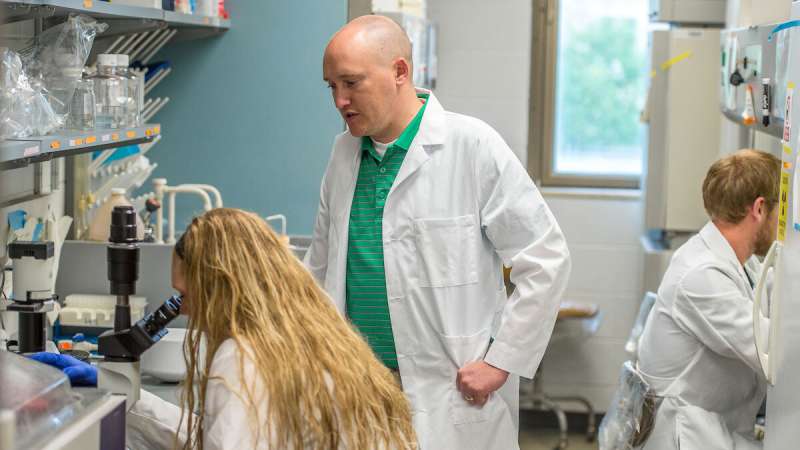Protein rewires metabolism to block cancer cell death, may allow cancer spread

One specific protein may be a master regulator for changing how cancer cells consume nutrients from their environments, preventing cell death and increasing the likelihood the cancer could spread, a study from the University of Notre Dame has shown.
The study, published in Cell Reports, was completed in the laboratory of Zachary Schafer, the Coleman Foundation Associate Professor of Cancer Biology in the Department of Biological Sciences.
Schafer and collaborators found a protein called SGK1, known to be activated in a variety of cancer cell types, signals the cell to take up nutrients. These nutrients include glucose, which allows the cell to survive after it detaches from the scaffold of proteins it had been attached to, called the extracellular matrix. Non-cancerous cells often die after detaching from the extracellular matrix, but SGK1 activity promotes survival and therefore increases the chances that the cancer could spread, or metastasize.
"If you better understand precisely how cancer cells that are potentially metastatic survive in these sorts of foreign environments, then you can potentially antagonize those survival pathways and selectively cause those cells to die," said Schafer, also an affiliate member of Notre Dame's Harper Cancer Research Institute.
More than 90 percent of cancer deaths are caused by metastasis of cancer cells from one location to another, Schafer said. For instance, breast cancer can metastasize to the brain, and metastatic cancer cells need to adapt to the new environment there.
There are unique circumstances where the SGK1 protein is critically important, so there might be a vulnerability that researchers can target and alter the way the cells process their nutrients, said Schafer.
This discovery appears to be broadly relevant across many different types of cancer, Schafer said, with research in this paper focused on breast and colon cancer cells grown in cultures under different conditions. The research took place over a number of years, and in addition to a collaboration with the Duke University School of Medicine and Northwestern University Feinberg School of Medicine, several Notre Dame postdoctoral, graduate and undergraduate researchers assisted with the work.
The next step in the research is to complete a "proof of principle" study, which is an early-stage investigation of how this knowledge could be leveraged for clinical benefit. Such a study could reveal if different agents—which could become therapeutics—could potentially eliminate the cells in question.
"If you can kill those cells that are potentially metastatic, then potentially you can get to a point where you can block cancer dissemination," Schafer said.
More information: Joshua A. Mason et al. SGK1 signaling promotes glucose metabolism and survival in extracellular matrix detached cells, Cell Reports (2021). DOI: 10.1016/j.celrep.2021.108821





















